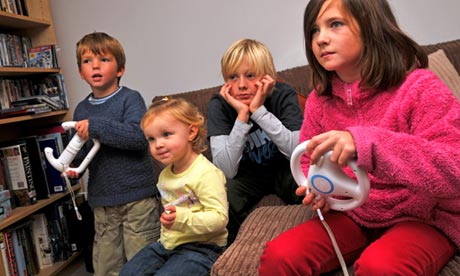Pete Etchells
A recent briefing from Public Health England warns that too much screen time is causing emotional problems in children. But is it that simple?

Public Health England this week announced that too much time in front of TV and computer screens is causing increasing psychological problems, such as depression and anxiety, in children. The report, which can be found here, suggests that the amount of time spent playing computergames was negatively associated with wellbeing in children – in other words, their general mental and physical health, resilience and the extent to which they are happy or worry about different aspects of their lives. The effects, particularly on mental health, were most pronounced for those children who spent more than four hours a day using some sort of screen-based technology.
While this sounds all doom and gloom, there are some caveats that need to be taken into account. The briefing was released to coincide with theChange4life campaign, and isn't a piece of peer-reviewed, scientific research. In its discussion of screen time, it cites data from other reports, for example, commissioned for the Department of Health that are themselves secondary analyses of existing data sets, such as theMillennium Cohort Study. If you have a read of these reports, it's really difficult to get a sense of what they did and didn't control for in looking at the effects of playing video games or watching TV.
But it's worth pointing out that the PHE briefing starts off with a very clear outline of the limitations of their research – perhaps the most important being that it's not possible to establish causal links from most of the studies involved. In other words, when a study says that 'X is associated with Y', it doesn't mean that 'X causes Y', which is how it can often be interpreted. It could also mean 'Y causes X', or maybe some other factor is having an effect on both.
So it's a shame when you see headlines such as the Independent's"Overload of screen time causes depression in children", or the Daily Mail's "TV is making children unhappy" – the study didn't say anything like this at all.
But what do we actually know about the effects of screen time on childhood development? It's actually a really tough question to answer, in part because "screen time" is a pretty rubbish concept. It takes into account the use of anything that has a screen – TVs, mobile phones, games consoles and tablets. In a sense, it's easy to see how it's a compelling measure to use: it's a simple idea that everyone can easily relate to. The trouble is, it doesn't really do justice to the sheer diversity of content that screen-based technology can provide. For instance, two hours of watching Teletubbies is probably going to affect our behavior in a completely different way to playing Halo for a couple of hours (although it's questionable which one will do the more damage).
With this issue in mind, what does recent scientific evidence in this area look like? In March, researchers at the Public Health Sciences Unit in Glasgow published data that also came from the Millennium Cohort Study (although it wasn't cited in the PHE briefing), which looked at whether watching TV or playing video games at aged 5 was associated with behavioural or psychological problems at age 7. They controlled for a large number of factors that could potentially impact on their results – things like health, family socioeconomic status, frequency of parent-child activities, and a measure of chaos in the household.
The results showed that when considering screen time on its own, there were associations between the amount of time spent at a screen and all of the problems they looked at – hyperactivity, conduct disorder, peer relationship problems, and so on. However, these associations all but disappeared once the confounding factors mentioned above were included. The remaining significant association was between viewing TV for more than three hours per day and conduct disorder.
Obviously, one study doesn't tell the whole story – for instance, we know that the amount of time spent watching TV is linked to poorer physical health. But we also know that there is – or should be – a distinction between passive and active screen time. Along these lines, a systematic review from 2010 pointed out that active video games actually promote light-to-moderate physical activity in children.
As it stands though, research into the long-term effects of screen time is still relatively young, so we don't yet know what effects playing video games, using computers, or watching TV has on childhood development.
In releasing the briefing alongside the change4life campaign, the PHE is trying to encourage people to take up a more active lifestyle, swapping the car for bikes or walking, limiting screen time and cutting down on unhealthy snacks in favour of healthier foods. These are all great ideas, but it seems that the best way to stay healthy is to change all of these things, not just one.
In the same way, we must be wary of looking at the effects of screen time in isolation from the myriad factors in the wider home environment that could be impacting on childhood behavioural development.
No comments:
Post a Comment